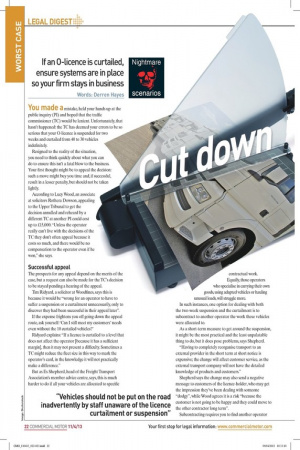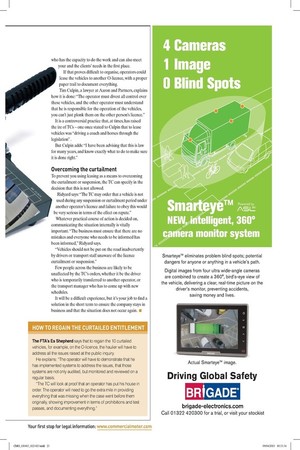If an 0-licence is curtailed, ensure systems are in place so your firm stays in business Words. ....a Hay..
Page 15

Page 16

If you've noticed an error in this article please click here to report it so we can fix it.
You made a mistake, held your hands up at the public inquiry (PI) and hoped that the traffic commissioner (TC) would be lenient. Unfortunately, that hasn't happened: the TC has deemed your errors to be so serious that your 0-licence is suspended for two weeks and curtailed from 40 to 30 vehicles indefinitely.
Resigned to the reality of the situation, you need to think quickly about what you can do to ensure this isn't a fatal blow to the business. Your first thought might be to appeal the decision: such a move might buy you time and, if successful, result in a lesser penalty, but should not be taken lightly.
According to Lucy Wood, an associate at solicitors Rothera Dowson, appealing to the Upper Tribunal to get the decision annulled and reheard by a different TC at another PI could cost up to £15,000. "Unless the operator really can't live with the decisions of the TC they don't often appeal because it costs so much, and there would be no compensation to the operator even if he won," she says.
Successful appeal The prospects for any appeal depend on the merits of the case, but a request can also be made for the TC's decision to be stayed pending a hearing of the appeal.
Tim Ridyard, a solicitor at Woodfines, says this is because it would be "wrong for an operator to have to suffer a suspension or a curtailment unnecessarily, only to discover they had been successful in their appeal later".
If the expense frightens you off going down the appeal route, ask yourself: 'Can I still meet my customers' needs even without the 10 curtailed vehicles?'
Ridyard explains: "If a licence is curtailed to a level that does not affect the operator [because it has a sufficient margin], then it may not present a difficulty. Sometimes a TC might reduce the fleet size in this way to mark the operator's card, in the knowledge it will not practically make a difference."
But as Es Shepherd, head of the Freight Transport Association's member advice centre, says, this is much harder to do if all your vehicles are allocated to specific contractual work. Equally, those operators who specialise in carrying their own goods, using adapted vehicles or hauling unusual loads, will struggle more.
In such instances, one option for dealing with both the two-week suspension and the curtailment is to subcontract to another operator the work these vehicles were allocated to.
As a short-term measure to get around the suspension, it might be the most practical and the least unpalatable thing to do, but it does pose problems, says Shepherd.
"Having to completely reorganise transport to an external provider in the short term at short notice is expensive; the change will affect customer service, as the external transport company will not have the detailed knowledge of products and customers."
Shepherd says the change may also send a negative message to customers of the licence-holder, who may get the impression they've been dealing with someone "dodgy", while Wood agrees it is a risk "because the customer is not going to be happy and they could move to the other contractor long term".
Subcontracting requires you to find another operator who has the capacity to do the work and can also meet your and the clients' needs in the first place. 111011° If that proves difficult to organise, operators could lease the vehicles to another 0-licence, with a proper paper trail to document everything.
Tim Cu1pin, a lawyer at Aaron and Partners, explains how it is done: "The operator must divest all control over these vehicles, and the other operator must understand that he is responsible for the operation of the vehicles, you can't just plonk them on the other person's licence."
It is a controversial practice that, at times, has raised the ire of TCs — one once stated to Cu1pin that to lease vehicles was "driving a coach and horses through the legislation".
But Cu1pin adds: "I have been advising that this is law for many years, and know exactly what to do to make sure it is done right."
Overcoming the curtailment To prevent you using leasing as a means to overcoming the curtailment or suspension, the TC can specify in the decision that this is not allowed.
Ridyard says: "The TC may order that a vehicle is not used during any suspension or curtailment period under another operator's licence and failure to obey this would be very serious in terms of the effect on repute." Whatever practical course of action is decided on, communicating the situation internally is vitally important. "The business must ensure that there are no mistakes and everyone who needs to be informed has been informed," Ridyard says.
"Vehicles should not be put on the road inadvertently by drivers or transport staff unaware of the licence curtailment or suspension."
Few people across the business are likely to be unaffected by the TC's orders, whether it be the driver who is temporarily transferred to another operator, or the transport manager who has to come up with new schedules.
It will be a difficult experience, but it's your job to find a solution in the short term to ensure the company stays in business and that the situation does not occur again. • HOW TO REGAIN THE CURTAILED ENTITLEMENT The FTA's Es Shepherd says that to regain the 10 curtailed vehicles, for example, on the 0-licence, the haulier will have to address all the issues raised at the public inquiry.
He explains: "The operator will have to demonstrate that he has implemented systems to address the issues, that those systems are not only audited, but monitored and reviewed on a regular basis.
"The TO will look at proof that an operator has put his house in order. The operator will need to go the extra mile in providing everything that was missing when the case went before them originally, showing improvement in terms of prohibitions and test passes, and documenting everything."







































